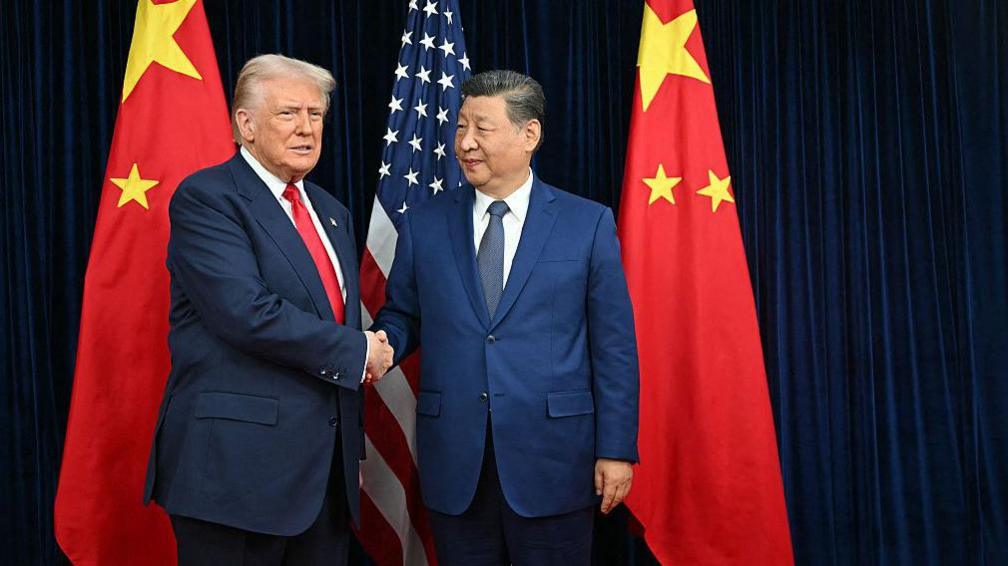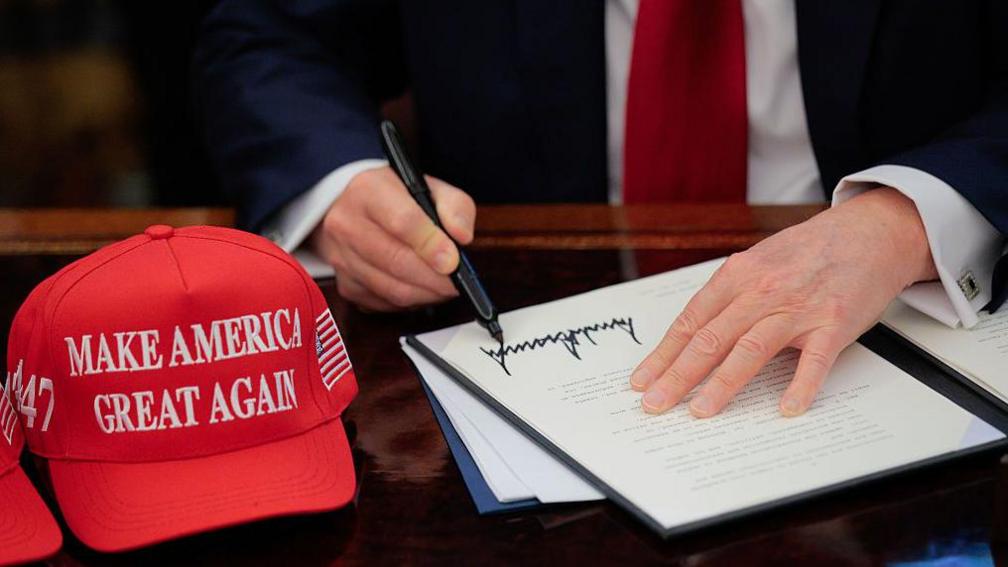Xi and Trump find temporary truce as China plays longer game
Watch: US and China's different reports of their trade meeting
- Published
US President Donald Trump came away from his meeting with Chinese leader Xi Jinping full of bombastic optimism.
He called it a "great success" and rated it 12, on a scale of 1 to 10. China was less enthusiastic. Beijing's initial statement sounds like an instruction manual, with Xi urging teams on both sides to "follow up as soon as possible".
Trump is after a deal that could happen "pretty soon", while Beijing, it appears, wants to keep talking because it's playing the long game.
There was a more detailed second Chinese statement that echoed what Trump had said on board Air Force One.
Among other things, the US would lower tariffs on Chinese imports, and China would suspend controls on the export of rare earths - critical minerals without which you cannot make smartphones, electric cars and, perhaps more crucially, military equipment.
There is no deal yet, and negotiators on both sides have already been talking for months to iron out the details. But Thursday's agreement is still a breakthrough.
It steadies what has become a rocky relationship between the world's two biggest economies and it assures global markets.
But it is only a temporary truce. It doesn't solve the differences at the heart of such a competitive relationship.
"The US and China are going in different directions," says Kelly Ann Shaw, who was an economic adviser to Trump in his first term.
"It's really about managing the breakup in a way that does a limited amount of damage, that preserves US interests, and I think from China's perspective, preserves their own interests. But this is not a relationship that is necessarily going to improve dramatically anytime soon."
'Struggle, but don't break'
There is an art to doing a deal with Trump.
It involves flattery - and most countries have tried it, including on his trip to Asia so far. South Korea gave him an enormous golden crown, while Japan's prime minister nominated him for a Nobel Peace prize.
But the Chinese leader offered only a meeting at a South Korean air base, where he and Trump would cross paths - as one flew in to the country, and the other departed.
It didn't feel out of step with China's guarded but defiant response from the start of Trump's trade war. Just days after the American president increased tariffs on Chinese goods, Beijing retaliated with its own levies.
Chinese officials told the world that there would be no winners in a trade war. Like Trump, Xi too believed he had the upper hand - and he seemed to have a plan.
He decided to use the country's economic weight - as the world's factory, as a massive market for its goods - to push back.
Unlike Trump, he does not need to worry about elections or a worried vote base.
That doesn't mean that Xi faces no pressures - he certainly does. He needs China's economy to grow, and create jobs and wealth so the Chinese Communist Party's power is not challenged by instability or discontent.

And yet, despite the country's current challenges - a real estate crisis, high youth unemployment and weak consumer spending - China has shown it is willing to absorb the pain of Trump's tariffs.
Beijing would "fight until the bitter end" was the message from various ministries.
"China's main principle is struggle, but don't break," says Keyu Jin, author of The New China Playbook.
"And it has escalated to de-escalate, which is a very new tactic."
Xi had a plan
That is, China hit Trump where it hurt. For the first time, it limited exports of rare earths to the US - and China processes around 90% of the world's rare earth metals.
"The nuance often missed in the rare earths debate is that China has an overwhelming position over the most strategic bit of the rare earth supply chain - the heavy rare earths used in advanced defence systems," says Jason Bedford, macroeconomics expert and investment analyst.
"That advantage is far harder to dislodge than other parts of the rare earths industry."
So getting China to relax those export controls became a priority for Washington - and that was a key bit of leverage for Xi when he sat down with Trump.
China had also stopped buying US soybeans, which was aimed at farmers in Republican states - Trump's base.
Reports this week say Beijing has already started buying soybeans from the US again.
"If the US thinks that it can dominate China, it can suppress China, I think has proven to be wrong," Ms Jin says.
"This is really signalling to the world, especially the United States, that China needs to be respected, that it will not kowtow or give too many political or economic concessions."

US soybean farmers have been impacted by China's decision to stop buying the product
Trump's team has found itself dealing with a stronger China compared to his first term. Beijing has learnt lessons, too.
It spent the last four years finding new trade partners and relying less on US exports - nearly a fifth of Chinese exports once went to the US but in the first half of this year that figure dropped to 11%.
Xi showed up in South Korea - after officially confirming the meeting with Trump just the day before - to take part in political theatre that seemed to underline a position of strength.
As usual, he was in front of Trump for the handshake. He stood unblinking as Trump leaned forward to whisper in his ear - the kind of ad lib moment China abhors.
At the end of the meeting, Trump ushered Xi to his waiting car where the Chinese leader was immediately surrounded by his security team. The US president was then forced to wander off camera to find his vehicle alone.
And yet, there are many positives to take away from this superpower summit - the first of Trump's second term in office.
"China wants to be in a position of strength when it comes to negotiations, but it won't break the relationship, because that is in nobody's interest, including China's," Ms Jin says.
For starters, businesses, the markets and other countries caught in between the rivals will welcome the calm. But observers are not sure it will last.
"I think over the medium to long-term, the US and China have very serious differences, and I would not be surprised to see some more destabilisation in the next three to six months," says Ms Shaw.
Has Trump got the bigger, better deal with China he always wanted? Not yet.
Even if he does get a deal, and the two sides put ink on paper, Beijing has now shown that it is not willing to bend to Washington - and that it is more resilient.
The rivalry between the two sides is likely to continue, if or even when there is ever a done deal.
- Published5 November
